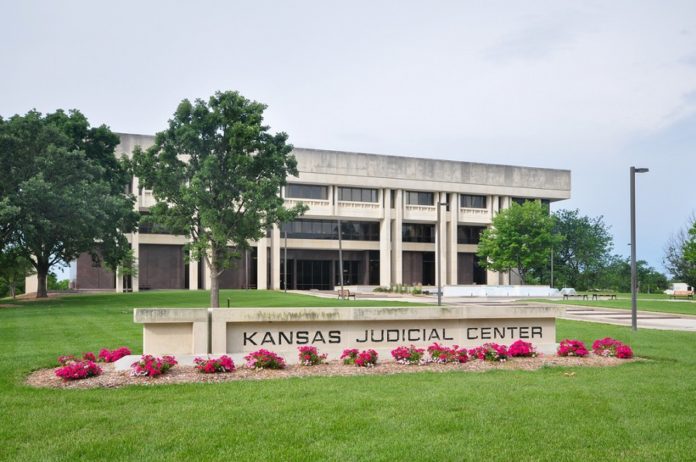(Updated to reflect final vote)
The Kansas Senate on Wednesday approved a bill suspending the state’s speedy trial rights for two years, an alternative to a three-year suspension approved by the House.
The Senate voted 32-7 to pass the bill, which is part of an ongoing effort in the Legislature to help relieve a backlog in the court system caused by the COVID-19 pandemic.
The House already voted 107-17 to pass a bill that suspends the speedy trial law until May 1, 2024, for all criminal cases to give the courts the ability to work through cases that have piled up during the pandemic.
The Senate bill suspends the state speedy trial right to May 1, 2023, after senators said a three-year delay was too long to make potentially innocent Kansans wait in jail for a trial.
The Senate bill also includes reporting requirements so lawmakers can gauge how much progress is being made toward reducing the backlog in courtrooms across the state.
The bill requires the state court administrator to report:
- The number of pending criminal cases on Jan. 1, 2022, and Jan. 1, 2023.
- The number of criminal cases resolved during fiscal years 2021 and 2022 and the method of disposition in each case.
- The number of jury trials conducted in criminal cases during fiscal years 2021 and 2022.
- The number of new criminal cases filed in fical years 2021 and 2022.
The reports must be submitted to lawmakers on or before Jan. 17, 2022, and again on Jan. 16, 2023.
Both the House and Senate bills preserve the speedy trial rights in state law, which is stricter than the broadly worded civil liberty enumerated in the Sixth Amendment of the U.S. Constitution.
Current state law has given the chief justice of the state Supreme Court the latitude to suspend judicial deadlines during an emergency disaster declaration.
The legislation would mean the state speedy-trial statute could be waived regardless of whether there is an emergency declaration in place.
If the current emergency declaration lapses without a new law, prosecutors would be under a tight deadline to try cases for defendants now being held or risk having them dismissed.
State law sets a 150-day requirement for holding trials for defendants who are in custody and 180 days for those who are out of custody.
“If the Legislature does nothing,” said Republican state Sen. Kellie Warren, “we will suffer from that inaction as a state.
“The courts and law enforcement will have no option but to release folks who have been charged with some of the most serious of crimes.

“This situation we’re in is very dire and is one of the most important policy decisions for this body to make,” Warren said.
Warren said it would be impossible to clear a backlog of more than 5,000 cases within the 150-day deadline set by state law.
The bill is a little different from what prosecutors and defense attorneys agreed to when they were asked by lawmakers to craft a solution to the dilemma facing the state.
The House ratified that agreement for a three-year delay in speedy-trial rights despite concerns that lawmakers weren’t sufficiently considering the rights of someone in jail awaiting trial.
Democratic state Sen. David Haley of Kansas City acknowledged that not everyone on the Senate Judiciary Committee supported the idea of a two-year delay.
Haley pointed out that some lawmakers supported just a one-year delay, a deadline that prosecutors said would have been impossible to meet.

“Everybody wasn’t happy with this,” Haley said.
“There are some, including myself, that thought that 2022 or next year when hopefully the pandemic is under control and we’re able to evaluate and see those jury trials reduce in numbers so we wouldn’t have to potentially tread on people’s rights,” he said.
Warren agreed that the issue confronting the state didn’t present easy solutions.
“This is a serious public safety issue,” Warren said. “I am pleased that we have reached a solution though it’s not ideal, it’s not ideal for anyone.
“It’s critical that this body move this issue forward to keep our communities safe,” she said. “It’s not ideal, but it’s something we still need.”















